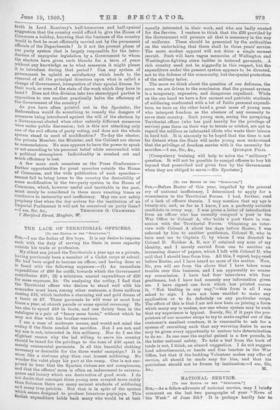THE LACK OF TERRITORIAL OFFICERS.
[To THE EDITOR OF THE " SPECTATOR."] Silto."—I am the father of five boys. It is my desire to impress each with the duty of serving the State in some capacity outside his trade or profession.
My eldest son joined the Territorials a year ago as a private, having previously been a member of a Cadet corps at school. He bad been urged to become an officer, and having done so is faced with the following expenses :—(1) An immediate expenditure of £60 for outfit, towards which the Government contributes £20; (2) a minimum annual expenditure of £20 for mess expenses, &c. On analysing the outlay, I find that the Territorial officer who desires to stand well with his comrades must have, among other costumes, a dress uniform costing £16, which includes a charming red and gold dream of a tunic at £7. These garments he will wear at most four times a year, at church parade or some special ceremony. He has also to spend £10 in boots, and one dainty item in the catalogue is a pair of "fancy mess boots," without which he may not dine with his brother-warriors.
I am a man of moderate means, and would not mind the outlay if the State needed the sacrifice. But I am not, and my son is not, interested in this millinery. Nor do I see the slightest reason why the lad willing to serve his country should be taxed for the privilege to the tune of £40 spent in merely ornamental garments. Is all this beautiful clothing necessary or desirable for the three weeks' campaign ? It is more like a costume play than real honest soldiering. No wonder the valet plays his part at the camp. One is not sur- prised to hear that the Spartan virtues are not conspicuous, and that the officers' mess is often an inducement to extrava- gance and luxury which are destructive of good work. I do not doubt that amongst these young men arrayed more richly than Solomon there are many earnest students of soldiering and many true patriots. But that is in spite of the system which seems designed to produce luxurious popinjays. This foolish expenditure holds back many who would be at best equally interested in their work, and who are badly wanted for the Service. I venture to think that the £20 provided' by the Government will procure all that is necessary in the way of uniforms. These should be presented by the authorities on the undertaking that there shall be three years' service. The more modest apparel will not deter a single earnest recruit. Such will have vague memories of Wellington and Washington fighting stern battles in tattered garments. A rich country need not be niggardly in this respect, but the expenditure under the present system appears to be directed, not to the defence of the community, but the special protection of the military tailor.
The more we think about the question of our defences, the more we are driven to the conclusion that the present system is a temporary, expensive, and dangerous expedient. While on the one band we have a few earnest and patriotic students of soldiering confronted with a lot of futile personal expendi- ture, we have on the other bend a great mass of young men who interpret freedom as the absence of any necessity to serve their country. Such young men, seeing the perspiring Territorial officer (who has paid heavily for the privilege of service) pass them on their way to tennis or cricket, are apt to regard the soldiers as infatuated idiots who waste their leisure in hard toil. It is sincerely to be hoped that the time is not far distant when the State will make young meu understand that the privilege of freedom carries with it the necessity for [Compulsory training will help to solve the " millinery " question. It will not be possible to compel officers to buy kit beyond that prescribed and given free by the Government when they are obliged to serve.—ED. Spectator.]










































 Previous page
Previous page